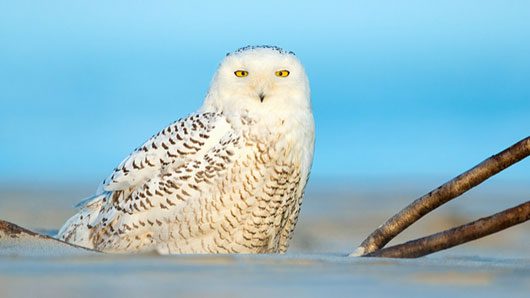How long do wintering Snowy Owls stay with us before they return to their breeding grounds?
April 1, 2009
Although we don’t have a good handle on when Snowy Owls get back to their breeding grounds, we do know that they typically start leaving the Lower 48 in March. Scattered reports may trickle in through April and into May or even June.
One reason we know so little about Snowy Owls is that they breed in the very remote, barren reaches of the high arctic, and they visit more populated areas in winter only sporadically. During the winter of 2013-2014, scientists took advantage of the remarkable Snowy Owl irruption by embarking on Project SNOWStorm. This project aims to fill in some of the gaps in our knowledge by satellite-tracking the movements of individual owls. As part of the project, Snowies have been tagged in Massachusetts, Pennsylvania, Maryland, Delaware, New York, and Minnesota.
Norman Smith of Mass Audubon has been studying Snowy Owls in Massachusetts since 1981, and is a part of Project SNOWStorm. He says that in big irruption years like 2013-2014, when there are lots of owls around, some stay till April, and occasionally to May. It is very rare to see one in June, but the latest record for a Snowy Owl in the state of Massachusetts is July 7.
The huge amount of publicly available data in eBird is a great resource for answering this sort of question, for Snowy Owls or any other species. You can use the Explore Data section to look at data in several ways:
- see a range map for an individual species
- look at bar charts for a location or region, showing how the relative abundance of species changes through the year
- choose a species and see graphs of relative abundance and other metrics over time
- see which species have been reported for particular locations
- narrow in on hotspots by seeing a color-coded map showing where the most species have been reported
Learn more about Snowy Owls in our species guide.
All About Birds
is a free resource
Available for everyone,
funded by donors like you
American Kestrel by Blair Dudeck / Macaulay Library

